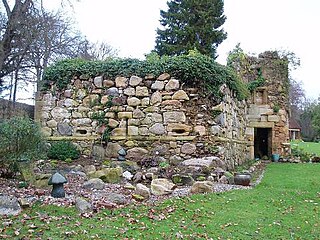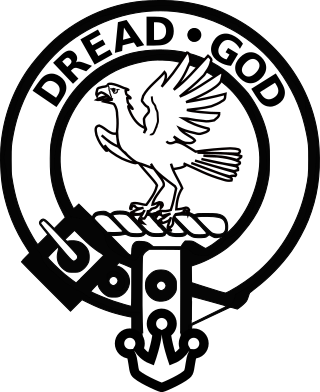See also
- Robert Monro (1601–1680), Scottish general, also spelt Munro
- Robert Monro (cricketer), English cricketer
- Robert Monroe (1915–1995), researcher into out-of-body experiences
Robert Munro may refer to:
Douglas, occasionally spelt Douglass, is a Scottish surname. It is thought to derive from the Scottish Gaelic dubh glas, meaning "black stream". There are numerous places in Scotland from which the surname is derived. The surname has developed into the given name Douglas. Douglas is a habitational name, which could be derived from any of the many places so-named. While there are numerous places with this name in Scotland, it is thought, in most cases, to refer to Douglas, South Lanarkshire, the location of Douglas Castle, the chief stronghold of the Lords of Douglas. The Scottish Gaelic form of the given name is Dùbhghlas ; the Irish-language forms are Dúghlas and Dubhghlas, which are pronounced. According to George Fraser Black, in southern Argyllshire the surname is an Anglicised form of the surnames MacLucas, MacLugash.
John Munro may refer to:
Hector Munro or Monro may refer to:
Colonel Robert Munro of Foulis, also known as the Black Baron, was traditionally the 18th Baron of Foulis in Scotland. He was a soldier of fortune, who served in Germany under the banners of Gustavus Adolphus, king of Sweden. It is not certain how he got his epithet of the 'Black Baron', but quite possibly it was from the colour of his hair rather than any perceived martial ferocity. Although this Robert Munro is traditionally 18th Baron and 21st overall chief of the Clan Munro, he is only the 11th Munro chief that can be proved by contemporary evidence.

The Monro of Fyrish family were a Scottish family and branch of the ancient highland Clan Munro. The family produced a notable dynasty of doctors to London in the 18th and 19th century where they were involved in early work on curing 'insanity'. Four generations occupied successively the position of (Principal) Physician of the notorious Bethlem Hospital (Bedlam). They were also leading members of a variety of important medical associations. Other members were painters, priests and philanthropists of note and one was an important early patron to J. M. W. Turner.

Kiltearn is a parish in Ross and Cromarty, Scotland. It is in the Presbytery of Ross.

Sir George Munro, 1st of Newmore (1602–1693) was a 17th-century Scottish soldier and member of parliament from the Clan Munro, Ross-shire, Scotland. He was seated at Newmore Castle. Between 1629 and 1634 Munro held command in the Swedish army during the Thirty Years' War, and from 1642 in the Scottish Covenanter army during the Irish Confederate Wars before changing his allegiance to the Royalist cause of Charles I in 1648 during the Scottish Civil War and Irish Confederate Wars.
Munro is a Scottish surname. It means "man from the River Roe" in County Londonderry, Northern Ireland. The surname is common in Ross-shire and other areas of northern Scotland; it also spread to Canada via emigration. Variant spellings of the same name include Monro, Monroe, Munroe, Munrow and Manrow.
Robert Mor Munro, 15th Baron of Foulis, and 18th chief of the Clan Munro was a 16th-century Scottish chief. He was known as Robert Mor on account of his large stature. He was the eldest son of Robert Munro, 14th Baron of Foulis. Although this Robert Munro is traditionally 15th Baron and 18th overall chief of the clan, he is only the 8th Munro chief that can be proved by contemporary evidence.
Sir Robert Munro, 3rd Baronet of Foulis, 21st Baron and 24th chief of the Clan Munro was a 17th-century Scottish soldier and politician.

The chiefs of the Scottish highland Clan Munro, the Munros of Foulis, are according to tradition, descended from a Donald Munro of Foulis who died in 1039. However, their descent can only be proved by contemporary evidence back to a Robert de Munro who died in 1369.

The Munros of Auchinbowie are a distinguished branch of the Scottish, highland Clan Munro. From this family three Professors of Anatomy at the University of Edinburgh, Scotland were produced, as well as several other doctors and military officers.
Sir Hector Munro, 2nd Baronet of Foulis was a Scottish noble and clan chief of the highland Clan Munro. He is also by tradition the 20th Baron and 23rd overall chief of the clan. However, he is actually the 13th chief of the Clan Munro who can be proved by contemporary evidence.
Sir Hector Munro, 1st Baronet of Foulis was a Scottish soldier, noble and clan chief of the highland Clan Munro. He is also by tradition the 19th Baron and 22nd overall chief of the clan. He is however the 12th chief of the Clan Munro who can be proved by contemporary evidence.

The Munros of Obsdale were a Scottish family and a cadet branch of the Clan Munro, a Highland Scottish clan. Their base was at Obsdale House, situated just north of the town of Alness in the Scottish Highlands. Some of the members of the Munro of Obsdale family were amongst the most distinguished Scottish military officers of the 17th century.

Clan Munro is a Highland Scottish clan. Historically the clan was based in Easter Ross in the Scottish Highlands. Traditional origins of the clan give its founder as Donald Munro who came from the north of Ireland and settled in Scotland in the eleventh century, though its true founder may have lived much later. It is also a strong tradition that the Munro chiefs supported Robert the Bruce during the Wars of Scottish Independence. The first proven clan chief on record however is Robert de Munro who died in 1369; his father is mentioned but not named in a number of charters. The clan chiefs originally held land principally at Findon on the Black Isle but exchanged it in 1350 for Estirfowlys. Robert's son Hugh who died in 1425 was the first of the family to be styled "of Foulis", despite which clan genealogies describe him as 9th baron.

The Skirmish of Alness was a conflict that took place in October 1715 in Alness, in the county of Ross in the Scottish Highlands. It was part of the Jacobite rising of 1715 and pitted Highlanders loyal to the British-Hanoverian Government of George I of Great Britain against Highlanders loyal to the Jacobite House of Stuart.
The Munros of Kiltearn were a minor noble Scottish family and a branch of the ancient Clan Munro, a Scottish clan of the Scottish Highlands.They were seated at Kiltearn House which was a manor house that shared the same name of the parish it was situated in, Kiltearn. In Scottish Gaelic the Munros of Kiltearn are known as the Sliochd-Alastair-Mhic-Uistean. The most famous member of the Munro of Kiltearn family was Donald Monro, High Dean of the Isles.

The Munro baronetcy, of Foulis in the County of Ross, was created in the Baronetage of Nova Scotia on 7 June 1634 for Colonel Hector Monro, with remainder to his heirs male whatsoever. On the death of his son, the 2nd Baronet, in 1651, the male line of the first Baronet failed and the title was inherited by Robert Munro, grandson of George Munro, uncle of the 1st Baronet.